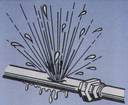WATER
- Main Water Shut Off Valve- Why do you need to know this??? If even the smallest pipe in your house- a 1/2" pipe bursts, depending on your water service, it could pump out 2 to 14 gallons PER MINUTE into your house. The faster you can shut off the main water valve for your house, the less damage you're going to have to deal with. Burst pipes are the most common cause of water damage reported to insurance companies each year. Find it and practice going there a couple of times this week to cement it into your brain. The main shut off valve is usually located where the main water pipes come into the house. It almost always has a simple faucet handle that you turn clockwise to shut off. If you live somewhere nice and toasty warm, your shut off may be located outside, under a rectangular shaped cover, near the curb. The valve may be a foot or more underground and require a special tool so check it out and see what you'll need to do the job. If you have a well system, like I do, there may be a shutoff where the water comes into the house and also one between the pressure tank and the rest of the house. You will have to close the shutoff that is located between the pressure tank and the rest of the house. If you only shut off the intake valve, all the water in the pressure tank will have to run out before it stops. so use the one after the pressure tank. If there is no shutoff on the water pipe, you can shut off the well's electrical circuit breaker to turn off the well pump.
- Individual water shut offs: are under sinks and by appliances. For each faucet there will be a hot and a cold valve under the sink. Know how to turn these off as well.
- Washing Machine Hoses: Did you know that broken washer hoses cause over $150 MILLION dollars in damage in the US each year?
The hoses should be replaced every 4 to 5 years according to manufacturers or 2 years according to the insurance industry. Before leaving for a trip, make sure that the water to your washer is shut off. These shut off valves are usually right behind the top of your washer. also take the time to replace your rubber hosing in exchange for metal or reinforced hoses which are less likely to burst.


- Find and know how to shut off the Main Electrical Shut off- to shut off the power to your entire house. The main circuit breaker is usually located at the top of the breaker box/ fuse panel and is visible even when the panel door is closed. The individual breakers can be seen only by opening the door to the box/panel. Switching the main circuit breaker to "off" will shut down electricity in the entire house. To find the breaker box/ fuse panel look for where the electric meter is on the outside of the house and usually it will be inside near that spot. Modern panels have a large number of circuit breakers. These breakers are like light switches that automatically turn off when too much electrical current flows through them. They can also be shut off manually just like a light switch. When a circuit breaker is flipped to the off position, there will be no power flowing to any of the devices attached to it.On the inside of the door, there should be a "map" with each breaker listed and the items connected to that breaker. If there isn't, take the time to flip each breaker and have someone tell you what went off, write them down so that in an emergency or in a maintenance situation, you will know which breaker controls what.
- If you have natural gas in your home and begin smelling it, get out. Do not pass go, do not collect $200- just get out. It is very important that you DO NOT turn off or on any lights and that you DO NOT use your phone. Also- DO NOT use your garage door if it is automatic. Walk out and call the gas company from your cell phone. Any of these actions could trigger a spark that could ingnite the gas fumes and cause an explosion. Want some confirmation on this? Look at These Images. Enough said.
- You should have a fire extinguisher in each floor of your house in case of a small fire or to help you escape one safely. You need to check them once a year to make sure they are still pressured and that they haven't expired. Practice with your family going and getting them so that their location is second nature. You don't want to have to hunt for one when you need it.
Hopefully you will never need to use some of this information but safety is being prepared for any emergency.


1 comment:
Oh man, I really need to work on this one, as we live in earthquake-prone Southern California. I know how to shut off the gas, but the water? Not a clue.
Post a Comment